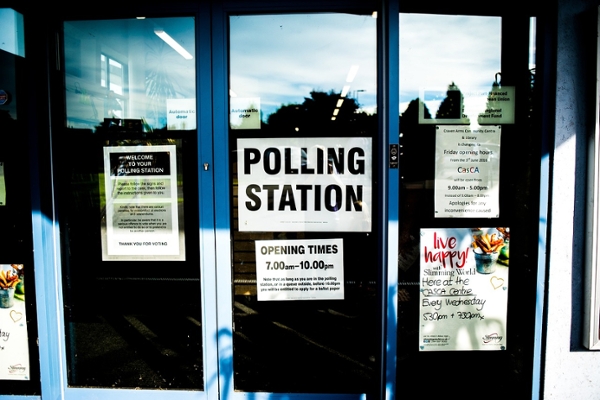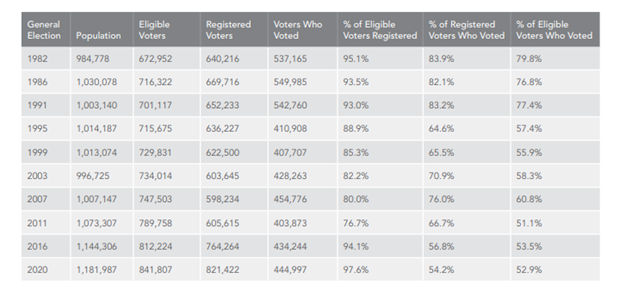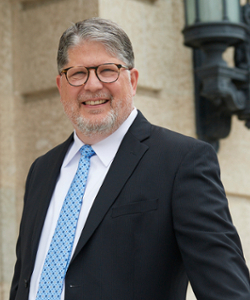
Policy that Governs Elections is the Foundation of a Healthy Democracy
There is no escaping today’s reality: more and more the challenges of democracy are in the headlines. It is evident around the world, whether in the presidential campaign unfolding in the U.S., in the unrest evidenced in the wake of Venezuela’s recent election, or in the rise of populist authoritarian figures across Europe, and elsewhere. Long considered the bedrock of western society, democracy itself is now often being questioned.
By Michael Boda, Chief Electoral Officer of SaskatchewanIntroduction
Download the JSGS Policy Brief
Download the Discussion Questions
In spite of these challenges, democracy and the electoral processes that support it in Canada, and here in Saskatchewan, remain vibrant and strong. The resilience of our core democratic traditions, which include freedom of speech, freedom of association and freedom to form political parties that run candidates in free-and-fair elections is deeply embedded. In the case of Saskatchewan, our commitment to democracy reaches back more than a century. For Canada, our democratic tradition dates to even before the creation of Canada itself in 1867. Through two World Wars, the Great Depression and a global pandemic, our democratic elections have served as a north star that has guided our nation and province.
Yet as someone who has worked around the globe in administering and evaluating elections, I can say democracy requires constant vigilance and effort to ensure the public’s faith in the system. We can’t take our commitment to democracy for granted and assume that what’s happening elsewhere is not relevant here, that we are somehow immune to the loss of trust in our democratic processes. When considered in that context, the policy that governs our elections and how we administer the execution of that policy is essential to maintaining a healthy democracy. This means paying attention to first principles. At Elections Saskatchewan, as the province’s independent body that administers elections, we are guided by our core values of trust, integrity, accessibility and accountability. Our strategic plan, as part of an effort to modernize elections in Saskatchewan, outlines the vision, mission, values and priorities that guide our organization’s decision making. So, what does this mean in practical terms?
One person, one vote
To put it simply, one person, one vote is situated at the very core of democracy. To quote the late U.S. journalist Sydney J. Harris: "Democracy is the only system that persists in asking the powers that be whether they are the powers that ought to be." Our ability to vote for the party or candidate we choose is what gives legitimacy to the public policy created by government. It is the source of the authority to the laws that govern us. We respect the law because we trust the system that created it. Therefore, citizens need to have confidence that their vote counts and that the system accurately reflects the results. It gives them their voice in determining the priorities and direction that governments will take. Fundamental to this is that we have free and fair elections.
In Saskatchewan, the framework for freeness and fairness is set out in The Election Act, the legislation that governs how elections are carried out in the province. The Act defines the powers and responsibilities of Elections Saskatchewan, the role of political parties and candidates in the electoral process, the financing of election campaigns, who is entitled to vote, the actual mechanics of the election process, and an array of other election-related issues. Passed by the elected members of the Legislative Assembly, the Act itself is a democratic expression of the province’s commitment to ensuring our elections will result in a free and fair process.
Given this foundation, our focus at Elections Saskatchewan has been on strengthening trust in the election system. We believe a key measure in doing exactly that is by broadening the public’s access to voting in the upcoming provincial election this October. We want to reduce any barriers that make it difficult for, or prevent, eligible voters from casting their ballots. To achieve this we have taken two important steps.
From Election Day to Voting Week
The first is to move away from the notion of an election day, when the vast majority of people have traditionally voted at—and only at—a specifically assigned geographical location, a transition that has been underway for some time now but never formalized. Instead, this election will unfold over a “voting week”. For six days and for extended hours polls will be open in every constituency. This will make voting more accessible and convenient. In the upcoming election, eligible voters can choose the time, location, and day of the week they wish to vote, including the last day of voting.
The challenge before us is that gradually over time both at the provincial and federal levels, we have witnessed a decline in voter turnout. There can be many reasons for it, but one that cannot be ignored is apathy, or a possible loss of faith in the democratic election system itself. The evidence of this decline in voter turnout is undeniable and raises the issue of whether public trust in the democratic process has been slowly eroding.
Statement of Votes, Elections Saskatchewan

In the 2020 provincial election the turnout of eligible voters was 52.9 percent, the latest in a series of lower turnouts from a level of almost 80 per cent as recently as 1982.1 Admittedly, the low voter response of four years ago might be at least partly attributed to the campaign being held in the midst of the COVID pandemic. With strict public health guidelines in place that were designed to limit the spread of the virus, it should not be surprising that it was a factor in suppressing the vote. Still, it was not an outlier in terms of recent history. Over the last 10 elections, six have had voter turnouts of less than 60 percent.2
Vote By Mail
A lesson learned from the 2020 election was that voting by mail has significant potential. To address the impact of the pandemic, Elections Saskatchewan opted to replace traditional absentee voting, which accounted for just 4,420 votes in the 2016 election, with a centralized and reworked vote-by-mail process. It involved an online portal that allowed people to apply for vote by mail, upload their identification documents, and receive a mail-in ballot kit. Ultimately, 57,245 individuals cast their ballot this way.
In the upcoming election we are again encouraging the use of vote by mail. It’s an option available to any eligible voter in the province. Individuals can apply for the mail-in ballot kit, which will be sent to them as soon as the election writ is issued and they can mail their completed ballot up to and including the last day of Voting Week. The objective is to provide greater convenience and accessibility to the vote.
No doubt there will be those who will suggest that the vote by mail option is fraught with the potential for abuse and cannot be trusted. In other words that it will actually erode trust in the election process. But the facts strongly support that the system is secure and safe. Unlike in systems elsewhere, where in some cases all eligible voters are automatically sent a mail-in ballot, Saskatchewan voters must apply, provide identification and be approved before they receive a mail-in ballot. Elections Saskatchewan then tracks each ballot as it moves into the postal system and knows when it has been returned for counting through a method that ensures secrecy of the ballot for those who have chosen this option.
As well in this election, we are offering homebound voting for those who are unable to leave their homes and vote in person due to a medical condition or caring for someone with a disability. We will also have voting available in personal care facilities, hospitals and remand centres.
In terms of verifying the vote count, which will be done by hand, party representatives can observe the process at every stage, ensuring the count is complete and accurate. Most ballots cast in-person will be counted on the night of the last day of Voting Week, once voting locations have closed during what is called the First Preliminary Count. Two days later, the Second Preliminary Count will be held to tally vote-by-mail ballots initially received. Consistent with the Election Act, the Final Count will be completed twelve days following the last day of voting, where all remaining vote-by-mail ballots posted by the last day will be counted, along with ballots cast by those who were hospitalized, in remand centres, or are temporarily displaced.
It’s important to note that although Elections Saskatchewan is independent of the political process and reports to the Legislative Assembly and not the government of the day, how we administer elections is based on policy designed and approved by the elected members of the Legislature through the Election Act. Working within that framework, the measures we implement have been established by elected members, not by Elections Saskatchewan.
Partner in Election Policy
In this sense, Elections Saskatchewan is a partner in the development of policy that fundamentally supports free and fair elections. Our role within the parameters of the Election Act is to ensure that the electoral process unfolds in a manner that not only supports but enhances the public’s trust and confidence that elections are the expression of a healthy democracy. As Chief Electoral Officer, my role is to provide expert advice on elections and democracy to the elected politicians. In that sense it is a role not dissimilar to that of a line department Deputy Minister, except in my case the advice is offered in public, with full transparency, consistent with Elections Saskatchewan’s independent and non-partisan role.
In that context, democracy itself is an on-going, strictly non-partisan policy project. It requires that the electoral process keeps pace with public expectations which are shaped by the rapid changes within the society it seeks to serve. The most obvious example of that fact has been the massive technological and communication changes we have witnessed in recent decades. We need to ask ourselves how those changes can apply to improve the administration and delivery of elections in the 21st century.
The challenge going forward is how we adapt the policy that shapes our elections in a way that doesn’t threaten the important democratic traditions that have served us well but allows for change to meet public expectations. At Elections Saskatchewan we believe that elections built on the four cornerstones of accessibility, accountability, integrity and trust are key to forming and defending a healthy democracy.
Michael Boda

Michael Boda has served as Chief Electoral Officer of Saskatchewan since 2012, conducting three general elections and twelve by-elections, while introducing a permanent register of voters and a new election management system. He is also a Policy Fellow at the Johnson Shoyama Graduate School of Public Policy. Since 1995, Boda has provided advice to national and international institutions on issues relating to election administration, law, and assessment. He has served on the senior staff of the International Foundation for Electoral Systems and provided advice on electoral matters to institutions including the UNDP, OSCE, and the Carter Center, working in countries including Jordan, Pakistan, Ghana, Scotland, and the United States. Boda has been a visiting research fellow at the Brookings Institution, the National Endowment for Democracy and has been an adjunct professor at Johns Hopkins University. He holds doctorates from Oxford and Johns Hopkins universities. He is the author of reports, assessments, and chapters, including most recently, with Keith Archer, “Elections – Why Such Differences?” in Canada and the United States: Differences that Count (Fifth Edition, eds DM Thomas, Chris Sands) Toronto: University of Toronto Press, 2023.
References
[1] 17, Statement of Votes, Report on 29th General Election
[2] ibid


